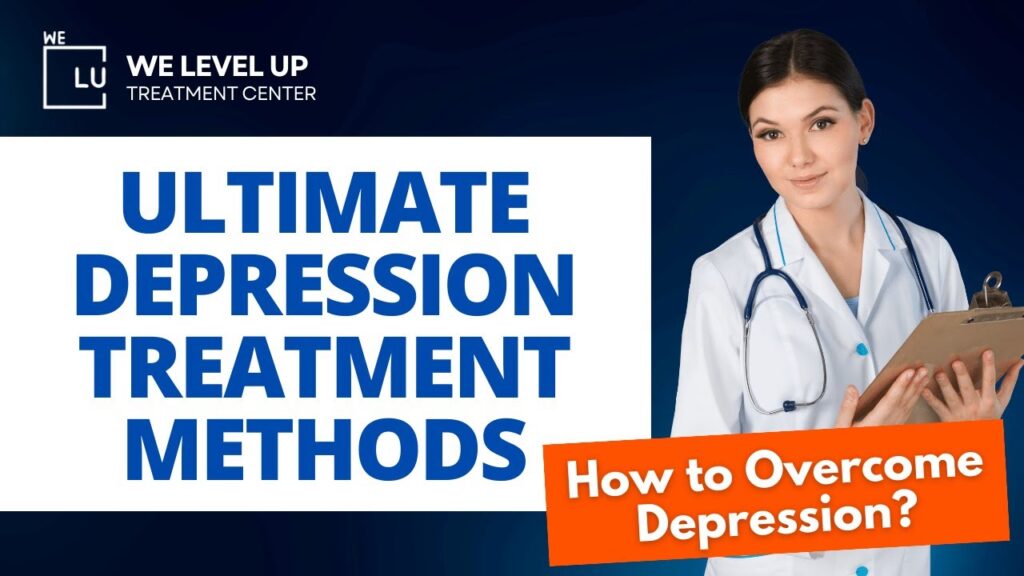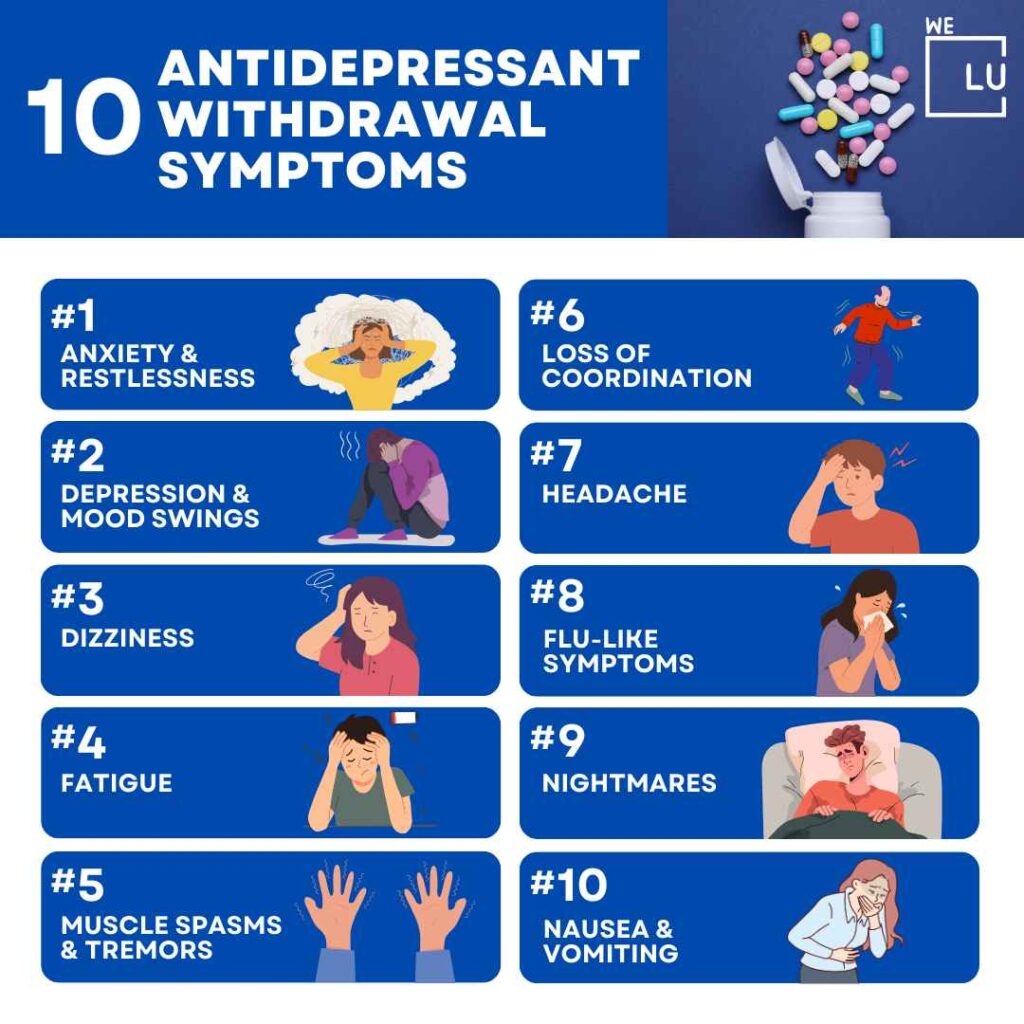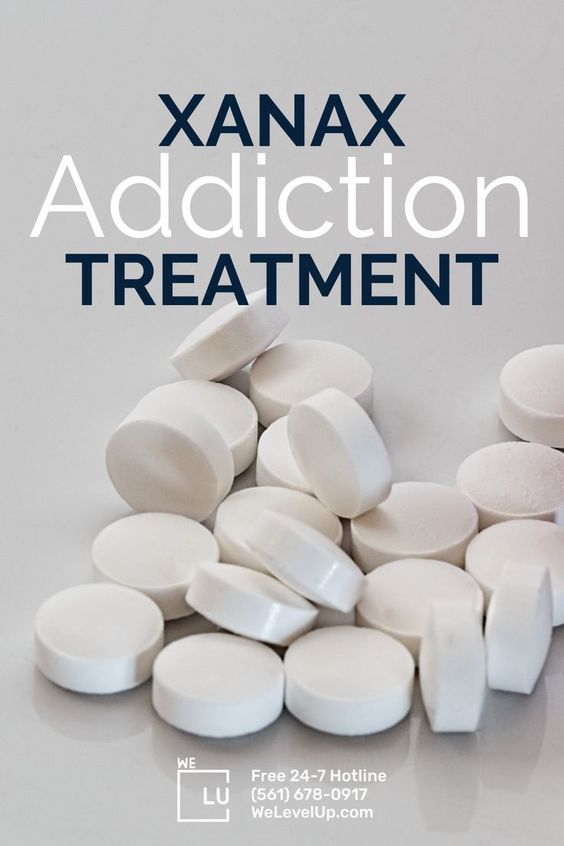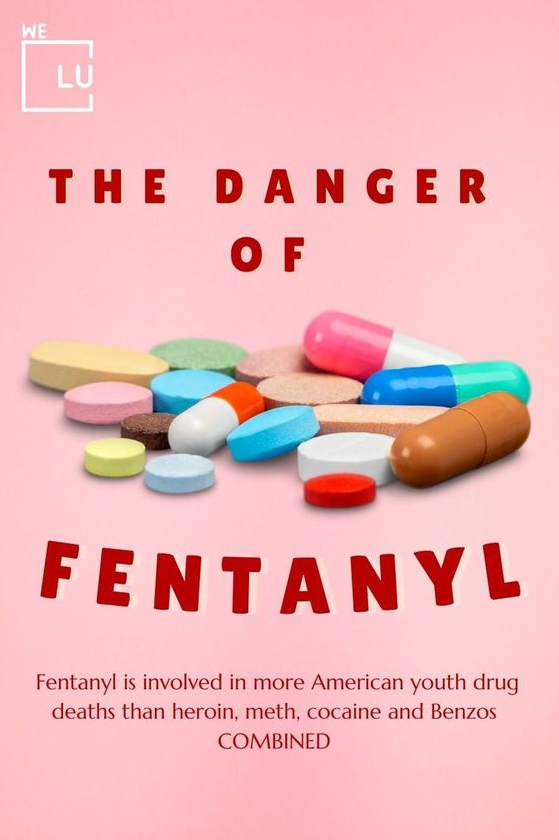What is Zoloft?
Zoloft is the brand name for Sertraline. This medication is an antidepressant that belongs to a class of drugs known as Selective Serotonin Reuptake Inhibitors (SSRIs). It is prescribed to treat depression, anxiety disorders, Obsessive-Compulsive Disorder (OCD), Post-Traumatic Stress Disorder (PTSD), and many others. Although it’s not associated with addiction like opioids, discontinuing can lead to Zoloft withdrawal.
Zoloft Side Effects
Zoloft is well-tolerated by most people, but like any medication, it can cause side effects in some individuals. This medication, like other antidepressants, may take several weeks to start working effectively. It’s vital to continue taking the medication as prescribed, even if symptoms do not improve immediately. That is unless instructed otherwise by a healthcare professional. Common side effects of Zoloft include:
- Nausea: Feeling sick to the stomach is a common side effect, especially when starting the medication. This side effect can get better over time as your body adjusts to the medication.
- Diarrhea or constipation: Zoloft can affect bowel movements, leading to either diarrhea or constipation in some people.
- Dizziness or lightheadedness: Some people may experience dizziness or feeling lightheaded. It happens mostly when they stand up quickly.
- Drowsiness or fatigue: Zoloft can cause drowsiness or fatigue, which may affect an individual’s ability to concentrate or perform tasks that require alertness.
- Insomnia: While some people may experience drowsiness, others may have trouble sleeping at night (insomnia) when taking Zoloft.
- Dry mouth: Zoloft may decrease saliva production, leading to a dry mouth sensation.
- Headache: Headaches are a common side effect of taking this medication. It happens frequently during the first few weeks of treatment.
- Changes in appetite or weight: Zoloft can either increase or decrease appetite, leading to weight gain or weight loss in some people.
- Sexual side effects: This medication may cause sexual side effects. This includes decreased libido (sex drive), difficulty achieving orgasm, or erectile dysfunction in men.
- Sweating: Some people may experience increased sweating. It happens often at night when individuals are under blankets during the winter time.
- Tremor or shaking: Zoloft can cause tremors or shaking in some individuals. It is more noticeable in the hands.
- Agitation or restlessness: Some people may feel agitated, restless, or anxious when taking Zoloft.
- Nervousness: This medication may increase the feelings of nervousness or jitteriness in some individuals.
Understand that these are common side effects. However, there can more serious ones. This can include suicidal thoughts, serotonin syndrome (a potentially life-threatening condition characterized by high levels of serotonin), and allergic reactions
Get addiction counseling for Zoloft withdrawal that works. Discover professional help from We Level Up Texas Treatment Center’s addiction and mental health therapists. Start getting support with a free call to our addiction hotline.
Get Help. Get Better. Get Your Life Back.
Searching for Accredited Drug and Alcohol Rehab Centers Near You? We Level Up Texas Is Opening Soon!
Even if you have failed previously and relapsed, or are in the middle of a difficult crisis, we stand ready to support you. Our trusted behavioral health specialists will not give up on you. When you feel ready or just want someone to speak to about therapy alternatives to change your life call us. Even if we cannot assist you, we will lead you to wherever you can get support. There is no obligation. Call our network hotline today.
FREE Addiction Hotline – Call 24/7Zoloft Addiction Symptoms
Zoloft (Sertraline) addiction is rare because it doesn’t produce the same addictive effects as substances like Opioids or stimulants. However, some individuals may abuse Zoloft, either by taking larger doses than prescribed or by using it without a prescription. This can lead to complex behaviors and potential health risks. Here are some signs and symptoms that may indicate the abuse of Zoloft:
- Taking higher doses than prescribed: Using Zoloft in larger amounts than prescribed by a healthcare provider can indicate abuse.
- Using Zoloft without a prescription: Obtaining and using Zoloft without a prescription from a healthcare provider is a form of abuse.
- Using Zoloft for non-medical purposes: Some individuals may misuse Zoloft for its mood-altering effects rather than its intended therapeutic purposes.
- Combining Zoloft with other substances: Mixing Zoloft with alcohol or other drugs can increase the risk of negative effects and indicate potential misuse.
- Continued use despite negative consequences: Continuing to use Zoloft despite experiencing negative effects, such as health problems or problems focusing on daily functioning, may indicate a substance use disorder.
- Preoccupation with obtaining and using Zoloft: Spending a significant amount of time and effort obtaining, using, or recovering from the effects of Zoloft may suggest a substance use disorder.
- Using Zoloft to cope with emotional distress: Using Zoloft as a way to cope with stress, anxiety, or other emotional difficulties without medical supervision can indicate misuse.
It’s important to know that experiencing some of these symptoms doesn’t necessarily mean someone is addicted to Zoloft. However, it can indicate some problematic patterns of use that might need further evaluation and intervention. If you or someone you know is struggling with Zoloft use, it’s vital to seek help from a healthcare professional or addiction specialist for proper assessment and support.

Skip To:
Learn More:
- Severe Depression Treatment, Causes, & Symptoms
- Inpatient Depression Treatment
- PTSD Treatment Strategies, Facts, & Diagnosis
- PTSD Symptoms in Women
- Postpartum Depression Symptoms & Causes
- Discover Effective Rehab for Depression and Anxiety Therapy.
- 101 Depression Quotes to Help You Feel Less Alone. Depressing Quotes.
- Relationship OCD Symptoms, Causes, Coping and Therapy Treatments
- The Most Effective OCD Medication for Treatments & Recovery. Best Medication for OCD Intrusive Thoughts.
- What Does Anxiety Feel Like? Why It Happens? Signs & Causes
- Anxiety Treatment Therapy, Medications, Coping Tips & Strategies

Get Your Life Back
Find Hope & Recovery. Get Safe Comfortable Detox, Addiction Rehab & Dual Diagnosis High-Quality Care.
FREE Addiction Hotline – Call 24/7Zoloft Withdrawal Symptoms
Zoloft withdrawal symptoms can occur when someone stops taking Zoloft (sertraline) abruptly or reduces their dosage too quickly. These symptoms can vary in severity and duration depending on factors such as the dosage, duration of treatment, individual physiology, and whether the medication was tapered off gradually or stopped suddenly.

Some common Zoloft withdrawal symptoms can include flu-like symptoms. Some individuals may experience headaches, body aches, fatigue, chills, and sweating. They can have gastrointestinal symptoms like nausea, vomiting, diarrhea, and stomach cramps. Dizziness or vertigo are common withdrawal symptoms as well. Some individuals may experience dizziness, lightheadedness, or the sensation of spinning (vertigo).
Another symptom is electric shock sensations, often described as “brain zaps” or “brain shivers.” These are quick sensations that feel like electrical jolts in the brain or throughout the body. Mood disturbances are often due to abruptly discontinuing Zoloft. This can lead to mood swings, irritability, agitation, anxiety, depression, or emotional lability.
A few more symptoms of Zoloft withdrawal can cause disturbances in sleep patterns. Most individuals experience insomnia, vivid dreams, or excessive sleepiness. There are some cognitive difficulties that are associated with this medication as well. Some individuals may experience difficulty concentrating, memory problems, or cognitive fog during withdrawal. Sensory disturbances are also some signs of a Zoloft withdrawal symptom. This may include sensory disturbances such as tingling sensations, numbness, or heightened sensitivity to light, sound, or touch.
Zoloft Withdrawal Timeline
The timeline for Zoloft withdrawal symptoms can vary from person to person. This also depends on factors such as the individual’s dosage, duration of treatment, metabolism, and whether the medication was tapered off gradually or stopped suddenly. Typically, Zoloft withdrawal symptoms can begin within a few days to a week after discontinuing Zoloft and can last for several weeks or even months in some cases. Here’s a rough timeline of withdrawal symptoms that individuals may experience:
Within 1-3 Days
Some individuals may start experiencing initial withdrawal symptoms shortly after discontinuing Zoloft. These symptoms may include flu-like symptoms such as headaches, nausea, dizziness, and fatigue.
1-2 Weeks
Zoloft withdrawal symptoms usually peak within the first two weeks after discontinuation. During this time, individuals may experience various physical and psychological symptoms. This can include gastrointestinal discomfort, and mood changes like anxiety or irritability. It can also disturb an individual’s sleep, and sensory disturbances (such as “brain zaps”).
2-4 Weeks
In the weeks following discontinuation, Zoloft withdrawal symptoms may gradually begin to improve for many individuals. However, some symptoms, such as mood and sleep disturbances, can continue or fluctuate during this time.
1-3 Months
For some individuals, specific Zoloft withdrawal symptoms can persist for several weeks or even months after discontinuing. This is mainly true for symptoms like mood disturbances, cognitive difficulties, and sensory disturbances. It’s important to note that the duration and severity of withdrawal symptoms can vary widely among individuals.
Longer-Term Effects
In some rare cases, some individuals may experience prolonged withdrawal symptoms that can persist for an extended period. This is sometimes referred to as Post-SSRI Withdrawal Syndrome (PSSD). These symptoms may include persistent mood disturbances, cognitive difficulties, and sensory disturbances. However, PSSD is relatively uncommon and normally resolves over time.
Opening Soon! First-Class Facilities & Amenities
World-Class High-Quality Addiction & Mental Health Rehabilitation Treatment
Coming Soon! Rehab Centers TourRenowned Addiction Centers. Serene Private Facilities. Inpatient Rehab Programs Vary.
FREE Addiction Hotline – Call 24/7Proven recovery success experience, backed by a Team with History of:
- 15+ Years Experience
- 100s of 5-Star Reviews
- 10K+ Recovery Successes
- Low Patient to Therapist Ratio
- Onsite Medical Detox Center
- Comprehensive Dual-Diagnosis Treatment
- Complimentary Family & Alumni Programs
- Coaching, Recovery & Personal Development Events
Zoloft Treatment Options
Although Zoloft addiction is rare, some individuals can misuse or abuse it. This medication can be abused either by taking larger doses than prescribed or by using it without a prescription. This can lead to problematic behaviors and potential health risks. Here are some treatment options for addressing Zoloft misuse or abuse:
Medical Detoxification
If someone has developed a physical dependence on Zoloft and is experiencing withdrawal symptoms upon discontinuation, a medical detoxification process may be necessary. Detoxification is a vital physiological function that occurs in organs such as the liver, kidneys, skin, lungs, and gastrointestinal tract. This process involves gradually tapering off the medication under medical supervision to minimize withdrawal symptoms and ensure safety.
Psychotherapy
Therapy can be beneficial for individuals struggling with Zoloft misuse or abuse. Cognitive-Behavioral Therapy (CBT), Dialectical Behavior Therapy (DBT), or Motivational Interviewing are some examples of therapeutic approaches that can help individuals understand and address the underlying reasons for their substance abuse. These approaches can help develop coping skills and make positive behavioral changes.
Medication-Assisted Treatment (MAT)
While there are no specific medications approved for the treatment of Zoloft misuse or abuse, MAT may be considered for individuals with co-occurring mental health conditions or substance use disorders. The combination of medication and therapy addresses the biological, psychological, and social factors that contribute to addiction in order to increase the likelihood of successful recovery.
Support Groups
Support groups such as Narcotics Anonymous (NA) or SMART Recovery can provide peer support, encouragement, and practical strategies for individuals struggling with substance misuse or abuse. This includes the misuse of prescription medications like Zoloft. These support groups typically hold regular meetings, either in-person or online. This is where members can share their experiences, listen to others, and participate in discussions on recovery-related topics. Many groups also offer additional resources such as literature, online forums, and helplines for individuals seeking support outside of meetings.
Medical and Psychiatric Care
Comprehensive medical and psychiatric care is essential for addressing any physical or mental health issues related to Zoloft misuse or abuse. Healthcare providers can assess and manage Zoloft withdrawal symptoms, monitor for any complications, and provide the appropriate treatment for underlying mental health conditions.
Educational Programs and Holistic Approaches
Education about the risks and consequences of Zoloft misuse or abuse can be helpful for individuals and their families in understanding the potential dangers and making informed decisions about treatment and recovery. There are holistic approaches such as mindfulness practices, yoga, exercise, nutrition therapy, and stress reduction techniques that can complement traditional treatment methods, techniques, or approaches. The support from family and friends overall can help speed the recovery process.
Family and Friends Involvement
Involving family members, loved ones, and friends in the treatment process can provide additional support and resources for individuals struggling with Zoloft misuse or abuse. Family therapy or education programs can help improve communication, strengthen relationships, and address family dynamics that may contribute to substance use.
It’s important for individuals struggling with Zoloft misuse or abuse to seek help from qualified healthcare professionals who can provide personalized assessment, treatment, and support. Recovery from substance misuse or abuse is a complex process that may require ongoing care and support. With the right treatment approach, individuals can achieve lasting sobriety and improved well-being.
Recovering from Zoloft Withdrawal.
Recovering from Zoloft withdrawal involves managing symptoms effectively and giving your body time to readjust. Below are some steps that can be taken to support the recovery process:
- Consult with a Healthcare Provider: If someone is experiencing Zoloft withdrawal symptoms, it’s essential to consult with a healthcare provider. They can provide guidance tailored to each individual’s situation and may recommend strategies to manage symptoms effectively. Some healthcare providers include substance abuse counselors, psychologists, social workers, psychiatrists, primary care physicians, nurses and rehab therapists.
- Gradual Tapering: If an individual is in the process of Zoloft withdrawal or is considering reinstating the medication, the healthcare provider may recommend a gradual tapering schedule. Gradually reducing the dosage of Zoloft under medical supervision can help minimize withdrawal symptoms and support a smoother change.
- Stay Hydrated and Nourished: Proper hydration and nutrition are important for supporting the body during the Zoloft withdrawal process. Be sure to drink plenty of water and consume a balanced diet that is rich in fruits, vegetables, lean proteins, and whole grains.
- Get Adequate Rest: Some Zoloft withdrawal symptoms can sometimes disrupt sleep patterns. Try to prioritize good sleep hygiene practices. This includes maintaining a consistent sleep schedule, creating a relaxing bedtime routine, and ensuring your sleep environment is helping to rest.
- Practice Stress Reduction Techniques: Managing stress can help alleviate some Zoloft withdrawal symptoms and support an individual’s overall well-being. Consider incorporating stress reduction techniques such as mindfulness meditation, deep breathing exercises, yoga, or spending time in nature.
- Stay Active: Regular physical activity can help boost a person’s mood and reduce anxiety. A person should engage in activities that they enjoy, whether it’s walking, jogging, cycling, swimming, or practicing yoga. This can help improve a person’s overall well being.
- Seek Support: Going through Zoloft withdrawal can be challenging, so don’t hesitate to reach out for support from friends, family members, or support groups. Talking to others who have experienced similar challenges can provide assurance, encouragement, and practical tips for coping.
- Monitoring Symptoms: An individual needs to keep track of their symptoms and the severity of it over time. This information can be helpful for their healthcare provider in assessing their progress and adjusting the treatment plan if necessary.
- Be Patient and Kind to Themselves: Recovering from Zoloft withdrawal takes time, and it’s expected to experience ups and downs during the journey. They would need to be patient with themselves, practice self-compassion, and celebrate small victories as they continue to recover.
Overcoming addiction is often a challenging process to go through alone. Many people experience relapses during Zoloft withdrawal in an attempt to relieve symptoms and satisfy cravings. However, you can manage Zoloft withdrawal symptoms and successfully recover with detox and rehab therapy and a robust support system at the We Level Up Texas Treatment Centers. If you require assistance with your rehab journey, contact a We Level Up Treatment professional now. Your call is free and confidential.
Get a free rehab insurance check without any obligation.
Opening Soon! World-class, Accredited, Anticipated 5-Star Reviewed, Effective Addiction & Mental Health Programs. Complete Behavioral Health Inpatient Rehab, Detox plus Co-occuring Disorders Therapy.
FREE Addiction Hotline – Call 24/7End the Addiction Pain. End the Emotional Rollercoaster. Get Your Life Back. Start Drug, Alcohol & Dual Diagnosis Mental Health Treatment Now. Get Free No-obligation Guidance by Substance Abuse Specialists Who Understand Addiction & Mental Health Recovery & Know How to Help.
(search here https://www.youtube.com/@weleveluptreatmentcenter1361/videos)
Start a New Life
Begin with a free call to an addiction & behavioral health treatment advisor. Learn more about our dual-diagnosis programs. The We Level Up treatment center network delivers recovery programs that vary by each treatment facility. Call to learn more.
- Personalized Care
- Caring Accountable Staff
- World-class Amenities
- Licensed & Accredited
- Renowned w/ 100s 5-Star Reviews
We’ll Call You
Search We Level Up Zoloft Withdrawal, Detox, Mental Health Topics & Resources
Sources
- Hardeep K. Singh, Abdolreza Saadabadi. National Library Of Medicine. (2023). “Sertaline“.
- MedlinePlus. (2022). “Sertaline“.
- Gabriel Matthew, Sharma Verinder. National Library Of Medicine. (2017). “Antidepressant discontinuation syndrome“.
- Cascade Elisa, Kalali H. Amir, Kennedy H. Sidney. National Library Of Medicine. (2009). “Real-World Data on SSRI Antidepressant Side Effects“.






